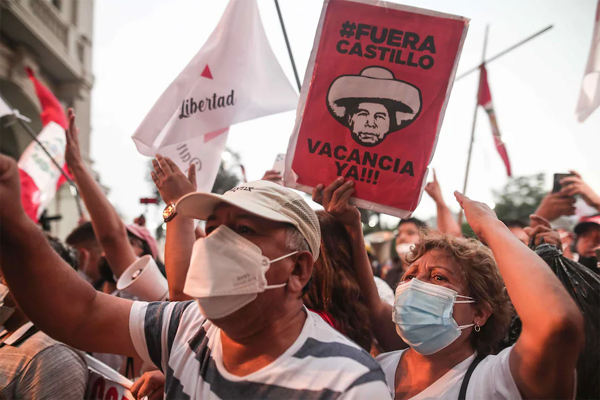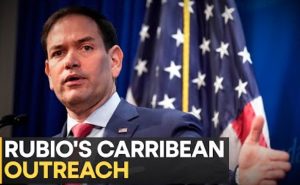
(Aldair Mejia/EPA-EFE)
By Mac Margolis
Incumbents age badly in Latin America. Set to leave office after four hapless years, Colombia’s Ivan Duque is testing record lows in the polls, boosters of Jair Bolsonaro take heart that only 46 percent of Brazilians rate him bad or horrible compared with 54 percent a month ago, and even Chile’s great millennial hope, Gabriel Boric, has seen his buoyant ratings sink by 13 percentage points after a month on the job.Sign up for a weekly roundup of thought-provoking ideas and debates
Yet perhaps no country has taken buyer’s remorse to the extremes of Peru. Five presidents have been pushed from power in as many years. On March 29, President Pedro Castillo narrowly escaped becoming the sixth, after a second impeachment drive fell short in congress. To judge by the fury in the streets of Lima and other cities over spiking food and fuel prices, and Castillo’s panicked strongman reply, it is unlikely to be his last.
Just eight months into office, Castillo is challenging one of his country’s most cherished tropes: that some standout Latin American economies can prosper even as politics succumbs to turmoil, partisan rancor and regicide. For a time in Peru, there was probable cause for such fairy tales. This nation of 33 million people consistently defied expectations and chronic political vertigo by growing robustly while keeping inflation under control, spending tame and investment flowing. Not even the lavish emergency cash (12 percent of gross domestic product) Peru distributed during the coronavirus pandemic has derailed government accounts. The fiscal deficit has narrowed to 2.6 percent, thanks partly to surging metal prices but also to sound budgeting. In a continent awash in red ink, Peru’s public debt is touted to decline this year.
Julio Valverde, a leathered technocrat who has helmed the country’s Central Reserve Bank since 2006, has managed to keep his footing as seven presidents battled internecine rivalries or corruption scandals. Twice named Central Banker of the Year for the Americas, and once as the top global pick, Valverde drew accolades even as tires burned and rivals schemed.
Castillo, a former schoolteacher and political neophyte who had never served elected office, was astute enough to keep Valverde on the job to mollify the markets even as he surrounded himself with sniping ideologues and waxed gauzily about a people’s government. But things fell apart.
Castillo was part of a wave of South American leaders thrust into office on a swell of indignation that roiled the region with drastic consequences for legacy parties and leaders. Time and again last decade, protesters seethed — Brazilians in 2013, Chileans in 2019 and 2021, and Colombians most of last year — over corruption and forfeited promises. The result is today’s hyperpartisan politics running on fast forward. By the time Castillo was seated last July, incumbency could be measured in months instead of years. The regicidal public mood went foul long before Russia’s invasion of Ukraine sent food, fertilizer and fuel prices surging.
The crisis is not just that politicians overstay their welcome. The problem is politics itself. At least 6 out of every 10 adults in the Americas say most, if not all, politicians are corrupt, a 22-country AmericasBarometer survey by the Latin American Public Opinion Project found last year. Nowhere does the funk run deeper than among Peruvians, 88 percent of whom say elected officials are dirty or compromised.
Where politicians are the enemy, democracy is collateral damage. In Latin America, touted among the most democratic regions, support for liberal democracy has fallen to its lowest level in three decades, according to a new study by V-Dem Institute, a politics think tank. Peru may be the early adopter. Recall former autocrat Alberto Fujimori, who closed congress to mute dissent back in 1992, so turning the “autogolpe” — the self-coup — into a Peruvian brand.
Castillo hasn’t helped his cause. Though his alleged impeachable offense was “moral incapacity” — a murky injunction as difficult to prove as it is certain to inflame the rabble — Peruvians needed little persuasion. In eight months, he has overhauled his cabinet four times and sent a record 45 ministers through the turnstile. Barely 1 in 4 Peruvians says he is doing a good job.
Not even an asbestos economy can withstand that sort of heat. While Peru is recovering, the economy will underwhelm. Business confidence is low and serial labor unrest has cost the crucial mining industry more than $400 million in forgone production amid a global minerals boom, the Peruvian Economic Institute calculated in March.
In another own goal, Fitch Ratings and Standard & Poor’s recently downgraded PetroPeru SA, the state owned oil major, to junk, even with fossil-fuel prices cresting.
“What’s clear is that while Peru will still grow, it may not develop,” said Nicolás Saldías, Andean analyst for the Economist Intelligence Unit. The fallout has spilled beyond the corner offices in Lima. The government’s own statistics bureau reported in December that nearly a third of the country doesn’t get enough to eat, while 39 percent go hungry in metropolitan Lima.
That’s a red flag for even the most charmed of Latin America’s leaders, who know how quickly yesterday’s swoon can become tomorrow’s rant.
_____________________________________________________
Mac Margolis, an adviser to the Brazilian Igarapé Institute, writes frequently about Latin America. He is the author of “The Last New World: The Conquest of the Amazon Frontier.” Energiesnet.com does not necessarily share these views.
Editor’s Note: This article was originally published by The Washington Post, on April 12, 2022. EnergiesNet.com reproduces this article in the interest of our readers. All comments posted and published on EnergiesNet.com, do not reflect either for or against the opinion expressed in the comment as an endorsement of EnergiesNet.com or Petroleumworld.
Use Notice: This site contains copyrighted material the use of which has not always been specifically authorized by the copyright owner. We are making such material available in our efforts to advance understanding of issues of environmental and humanitarian significance. We believe this constitutes a ‘fair use’ of any such copyrighted material as provided for in section 107 of the US Copyright Law. In accordance with Title 17 U.S.C. Section 107. For more information go to: http://www.law.cornell.edu/uscode/17/107.shtml.
EnergiesNet.com 18 04 2022












